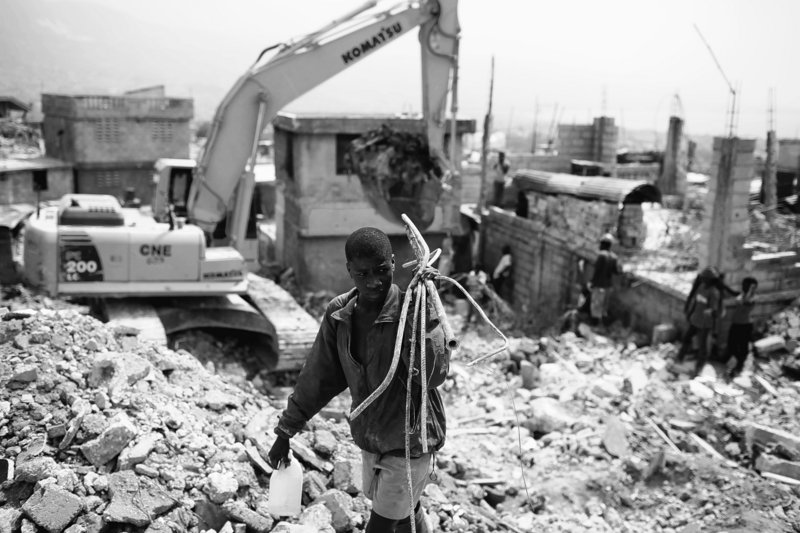PORT-AU-PRINCE, Haiti – Like a small-town booster, Randall Perkins proudly shows off his base camp: air-conditioned bedrooms and offices for 120 managers, a mess hall that can serve 1,000 meals a day, a gym and an infirmary alongside his bulldozers and dump trucks.
Pompano Beach, Fla.-based AshBritt Inc. so far has invested $25 million in its Haitian reconstruction operation covering a soccer field.
Now all Perkins needs is a government contract.
Nearly six months after the devastating January quake that killed as many 300,000 and destroyed much of the capital, not one major reconstruction contract has been awarded. That hasn’t stopped AshBritt and other masters of disaster from preparing for the day when the pledged international support — some $10 billion over the next decade — starts going up for bid.
Some companies, such as Ceres Environmental Services Inc. of Brooklyn Park, Minn., are veterans of the cleanup of Hurricane Katrina, where they hauled away tons of downed trees and branches from the 2005 storm. Ceres is building temporary homes for quake victims while preparing to bid for more work. Mobile, Ala.-based DRC Group has a 35-acre service yard in Port-au-Prince for hundreds of pieces of heavy equipment for demolition and debris removal.
Though they don’t know yet how big the contracts will be, they’re banking from experience on the tantalizing prospect of work for years to come. AshBritt was awarded nearly $900 million from the U.S. government for debris removal after Katrina, collecting and processing some 21 million cubic yards of wreckage.
“There’s a tremendous amount of work to do here,” Perkins said of Haiti. “There are a lot of slices in that pie.”
So far, governments and private groups have spent hundreds of millions of dollars on searches, rescues, emergency supplies and clearing rubble. But most of that work was done without competitive bidding and represents only a fraction of what eventually will be spent.
Very little of the promised foreign aid has been released, caught up either in legislative approval, bureaucratic regulations or in the complications of life in Haiti.
The U.S. Congress, for example, is still considering a bill that would provide up to $2 billion to Haiti. The Caribbean country, meanwhile, faces a dizzying — and time-consuming — array of logistical and legal issues, including securing permission to tear down buildings whose owners perished in the quake. Any land cleared for construction risks being taken over immediately by squatters.
But Prime Minister Jean-Max Bellerive, who will oversee the Interim Haiti Reconstruction Commission with former U.S. President Clinton, said financing and construction contracts would start to be issued within months.
There is much work to be done: The quake destroyed about 105,000 homes, 1,300 schools, 50 hospitals, the presidential palace, parliament, courts and the port.
Many other structures were damaged, and the country was left with enough rubble to fill the Louisiana Superdome five times.
Most of the companies seeking work in Haiti won’t talk about it, in part to avoid seeming like they are capitalizing on catastrophe.
There is also fierce competition for contracts to clear debris, carve new roads and drainage canals, restore the electrical grid and rebuild government offices.
AshBritt is one of the more open. The company has formed a joint venture with the GB Group, a conglomerate run by one of Haiti’s wealthiest men, Gilbert Bigio, and established partnerships with a number of smaller construction firms.
Perkins, a tall, garrulous executive who arrived days after the quake, expects to hire 600 to 700 Haitians within a year, as well as provide capital to the smaller local construction companies that it will work with in partnership.
“There is an opportunity in this terrible disaster to use the money that is coming in to make a difference,” he said at his base camp, the former site of the Israeli Defense Forces’ field hospital set up in the aftermath of the quake.
DRC Group has formed a partnership with Haiti’s V&F Construction and hired 300 local workers to demolish buildings, remove debris and set up portable toilets in the quake zone, according to a corporate statement.
It already been hired to demolish buildings and clear streets in Port-au-Prince and is expected to be a major competitor for the large government contracts to come.
The company declined requests for an interview.
Ceres Environmental, which was awarded nearly $500 million from the U.S. government to remove debris after Katrina, is partnering with Yele Haiti, the charity founded by Haitian-born singer Wyclef Jean, to build 100 temporary wood-framed homes for quake survivors.
David A. Preus, the company’s project manager for operations in the country, declined in an interview to discuss future contracts.
“The future of Haiti is very bright, and Ceres looks forward to being a part of that future,” Preus said.
Copy the Story Link
Send questions/comments to the editors.



Success. Please wait for the page to reload. If the page does not reload within 5 seconds, please refresh the page.
Enter your email and password to access comments.
Hi, to comment on stories you must . This profile is in addition to your subscription and website login.
Already have a commenting profile? .
Invalid username/password.
Please check your email to confirm and complete your registration.
Only subscribers are eligible to post comments. Please subscribe or login first for digital access. Here’s why.
Use the form below to reset your password. When you've submitted your account email, we will send an email with a reset code.